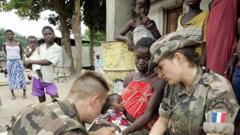Article text: Ivory Coast is poised to remove French troops from its territory, a significant step in diminishing the military legacy of its former colonial ruler. In a recent year-end speech, President Alassane Ouattara confirmed this shift, emphasizing that it showcases the commitment to modernizing the national military forces.
This withdrawal aligns with similar actions taken by Senegal, where President Bassirou Dioumaye Faye instructed government officials to end foreign military presences by 2025. Senegal, alongside Ivory Coast, represents the last bastions of French military engagement in West Africa, where approximately 600 French personnel have been based in Ivory Coast, and an additional 350 are located in Senegal.
French military involvement in West Africa peaked during the civil war in Ivory Coast between 2002 and 2007, where troops were crucial in safeguarding civilians. However, as anti-French sentiment grows across the region—exacerbated by military coups in Mali, Burkina Faso, and Niger—France has been compelled to reassess its military commitments and strategy throughout the continent. Recent developments prompted the Chadian government to sever its defense cooperation with France as part of a broader movement towards ending foreign military dependencies.
President Ouattara noted the transfer of the Port Bouét military battalion, currently operated by French forces, to control by Ivorian troops. This decision underscores a significant transition as nations in the region favor self-reliance in military operations.
Russia's increased influence in the Sahel, particularly after relationships frayed with France, could further alter the geopolitical landscape as military leaders in Niger, Mali, and Burkina Faso have leaned towards Russian assistance, evidenced by the presence of mercenaries to counter local insurgencies.
While France aims to maintain a limited military footprint, adjusting its presence primarily in Gabon and Djibouti, the move signifies a crucial period of military recalibration not just for Ivory Coast, but for West Africa as a whole.
Historically, the Ivory Coast has been characterized by its ethnic diversity and economic prosperity, earning a reputation for stability. Yet, a civil conflict fundamentally altered this narrative, challenging the nation's transition towards unity and peace. Today, as the world's leading exporter of cocoa beans, the Ivorian population continues to enjoy relatively better economic conditions compared to its West African neighbors.
This withdrawal aligns with similar actions taken by Senegal, where President Bassirou Dioumaye Faye instructed government officials to end foreign military presences by 2025. Senegal, alongside Ivory Coast, represents the last bastions of French military engagement in West Africa, where approximately 600 French personnel have been based in Ivory Coast, and an additional 350 are located in Senegal.
French military involvement in West Africa peaked during the civil war in Ivory Coast between 2002 and 2007, where troops were crucial in safeguarding civilians. However, as anti-French sentiment grows across the region—exacerbated by military coups in Mali, Burkina Faso, and Niger—France has been compelled to reassess its military commitments and strategy throughout the continent. Recent developments prompted the Chadian government to sever its defense cooperation with France as part of a broader movement towards ending foreign military dependencies.
President Ouattara noted the transfer of the Port Bouét military battalion, currently operated by French forces, to control by Ivorian troops. This decision underscores a significant transition as nations in the region favor self-reliance in military operations.
Russia's increased influence in the Sahel, particularly after relationships frayed with France, could further alter the geopolitical landscape as military leaders in Niger, Mali, and Burkina Faso have leaned towards Russian assistance, evidenced by the presence of mercenaries to counter local insurgencies.
While France aims to maintain a limited military footprint, adjusting its presence primarily in Gabon and Djibouti, the move signifies a crucial period of military recalibration not just for Ivory Coast, but for West Africa as a whole.
Historically, the Ivory Coast has been characterized by its ethnic diversity and economic prosperity, earning a reputation for stability. Yet, a civil conflict fundamentally altered this narrative, challenging the nation's transition towards unity and peace. Today, as the world's leading exporter of cocoa beans, the Ivorian population continues to enjoy relatively better economic conditions compared to its West African neighbors.



















